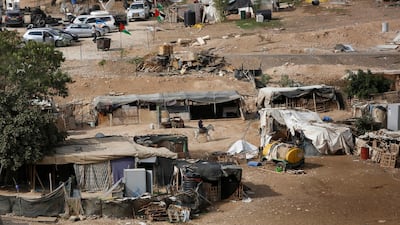Khan Al Ahmar is a collection of ragtag Bedouin tents and corrugated tin shacks, perched on a windswept, nondescript stretch of land outside Jerusalem. Like other unremarkable Bedouin villages in the West Bank, it is the subject of intense Israeli focus. For nearly a decade, Israel has tried to remove the residents of Khan Al Ahmar, demolish the village and take over the land. The effort is part of Tel Aviv’s plan to extend settlements through a 12 sq km area between Jerusalem and the mega-settlement of Maale Adumim, an area known as the E1, and the land where the villagers have lived for decades falls right in the middle of the new development. If successful, the Israeli plan would sever the West Bank in two, further detach Jerusalem from Palestinian areas and create an impossible hurdle for a two-state solution.
The 180 residents of Khan Al Ahmar, all members of the Jahalin Bedouin tribe, have taken on the formidable Israeli military’s efforts to destroy their village and are fighting them in the law courts. Every time the military issues a demolition order, they fight back via the legal system. Since 2009, the Israeli high court has issued several orders to postpone the demolition. This changed in September, giving the military the authority to demolish the village. Then something remarkable happened.
With an impending demolition order, Palestinian activists from around the West Bank descended on the village. Joined by international and Israeli activists, they have been non-violently confronting Israeli bulldozers and soldiers sent to level Khan Al Ahmar. The village is breathing new life into the Palestinian resistance movement against the Israeli occupation after several difficult years. It worked, too, with Israeli Prime Minister Benjamin Netanyahu indefinitely postponing the bulldozing of the village, although the following day he claimed it was only a temporary reprieve of “several weeks”.
It hasn’t always been this way. Just a year before the Arab uprisings, there was a sense of urgency on Friday mornings in Palestine. Across the West Bank, several villages would stage protests against the Israeli separation barrier, settlements and the occupation as a whole. Hundreds of international activists and a handful of Israeli supporters would join the villagers as they confronted heavily armed Israeli soldiers.
But that was then. Over the years, the movement has lost momentum – in the West Bank, at least. Israel arrested hundreds of Palestinians, often raiding villages that held protests and taking away dozens of children in the middle of the night as a means of applying pressure. At its best, the Palestinian Authority offered hollow words of support for this village struggle, possibly afraid of the power of a non-violent movement that could one day threaten its claim to power. In Gaza, however, perhaps with a sense of how little there is to lose, Palestinians have coalesced around the idea of non-violent resistance since the Great March of Return nearly seven months ago. Every Friday morning, hundreds and sometimes thousands of Palestinian hold mass demonstrations along the borders with Israel.
The power of non-violent civil action has been central to the Palestinian struggle against occupation. While most equate Israel-Palestine with cyclical outbursts of violence – in Gaza, during the second intifada or through extremist acts – non-violence has shaped the contours of the occupation. Throughout the 1980s, Palestinian civil society organised boycotts of everything from Israeli vegetables to universities. In a bid to shut down the West Bank economy, which has always been vital to the maintenance of the Israeli occupation, Palestinians would strike for days. These actions culminated in the first intifada, one of the crowning examples of non-violent resistance in the 21st century.
Watching apartheid South Africa crumble as a result of similar tactics and subsequent worldwide support, Israel took a forceful hand in stamping out resistance in the first intifada. The Oslo process followed but when the second intifada exploded, popular protest was quickly drowned out by violence targeting Israeli civilians. Instead of images of women and children protesting, the world saw images of burning Israeli buses and restaurants.
As the second intifada slowly died out, small villages across the West Bank picked up the mantle of non-violence from 2005. Facing the prospect of losing their land to the Israeli separation barrier or settlements, these villages confronted the occupation head-on.
When social media came onto the scene, protests were beamed across the world. All of a sudden, the occupation narrative – the one that posits Israel and Palestine as relative equals striving for peace and security – was challenged. Palestinians, devoid of their rights in a military occupation, were seen in their struggle for land and freedom. The intense global focus on the Middle East and the Arab uprisings only intensified the Palestinian struggle on the ground.
Khan Al Ahmar is bringing this struggle back to the forefront and this week achieved a remarkable result when Mr Netanyahu halted the demolition, albeit temporarily. The power of non-violence to force a change in Israeli strategy was on clear display. Oren Ziv, a photographer who has been staying in the village for the past month, wrote in the Israeli magazine +972: “A month ago, not a single person in Israel, the West Bank, or even around the world would have believed that the struggle of a few hundred activists could succeed in delaying – if not defeating completely – Netanyahu’s decision to demolish the village.”
It is unclear what will happen in the David and Goliath struggle over Khan Al Ahmar but the success the villagers enjoyed this week underlines the power of non-violence in Palestine. Throughout modern history, occupied and brutalised people standing up for their rights in the face of military aggression have had remarkable results. While it can take time to defeat the subjugation in Israel and Palestine, history is on the side of non-violent resistance.
Joseph Dana is the editor of emerge85, a project exploring change in the emerging world and its global impact

